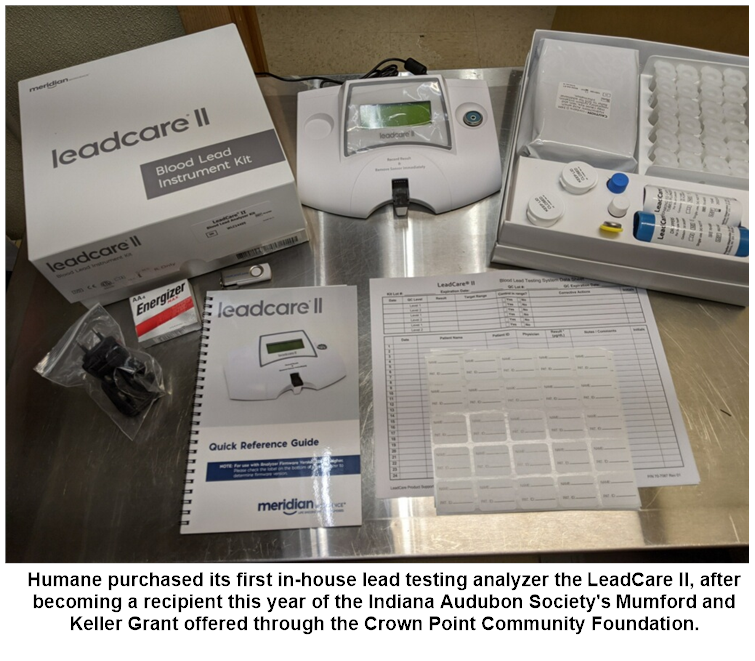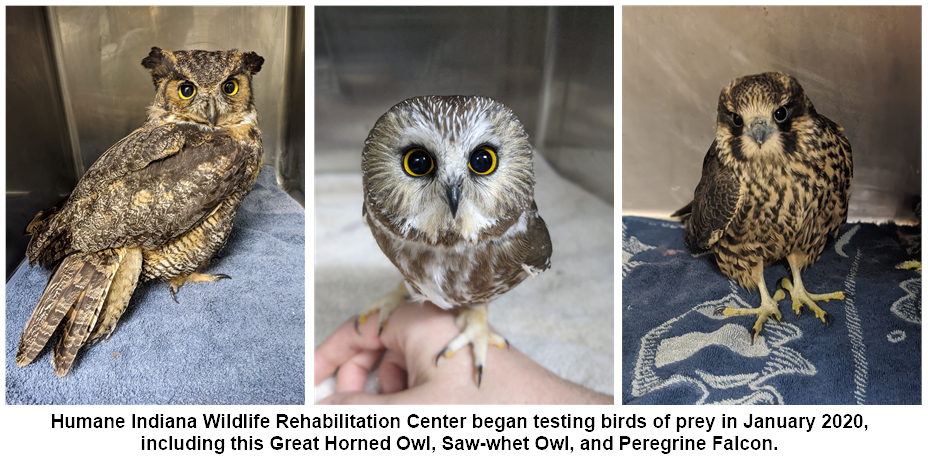
“By testing wildlife for lead, we are given the opportunity to provide better and more thorough care for the animals admitted to our center,” said Director Nicole Harmon, Humane Indiana Wildlife Rehabilitation and Education Centers.
Humane Indiana Wildlife (HIW) initially began its lead testing program in January, thanks to a grant from Crown Point Community Foundation and a partnership with Arbor View Animal Hospital of Valparaiso. The program, which currently focuses on testing birds of prey for trace amounts of lead, was initially prompted after a number of swans perished due to lead toxicity in Lake County in 2019. “Testing birds of prey for lead toxicity will help guide staff on how to

better treat the patients that come to the center. Birds that show elevated lead levels will either be provided more extensive supportive care or, in more severe cases, provided medications meant to remove lead from their bodies,” Harmon said.
“We know, for example, that elevated lead levels in birds of prey impact their energy, and when they’re too weak to hunt for food, they often find easier food sources, such as animal carcasses on roadsides,” Harmon explained. She added, “Seven of 34 birds of prey tested positive for elevated levels of lead so far this year. Of those seven, four were successfully treated and released back to their natural habitat.” Harmon said the remaining three did not survive their injuries after being struck by moving vehicles from either flying low over the road or feeding on road carcasses. When testing birds for elevated levels of lead, desired results are less than 2.5 micrograms per deciliter, but the birds who tested positive ranged from 3.3 to 26.5 micrograms per deciliter.

At the onset of the program at HIW, samples of blood were sent to IDEXX Laboratory for analysis. This diagnostic service required nearly 3cc of blood to be drawn from the birds and results were provided within 3-5 business days. This method of testing made it difficult to get samples from smaller species of birds of prey, who could not spare that much blood being drawn, for their safety. Testing practices changed last month, however, when the organization purchased its own in-house LeadCare II Analyzer for the wildlife center. “We are grateful to have the opportunity to further expand our quality of care thanks to the purchase of the analyzer through the Indiana Audubon Society’s Mumford and Keller Grant,” said CEO Brian Fitzpatrick, Humane Indiana. “Having our own analyzer allows us to not only test animals of all sizes in our care, but to receive the results in just 30 seconds, allowing staff to begin treatment almost immediately,” he added.
Through the center's intake procedures, staff is able to determine and track where animals are coming from that are testing with elevated levels of lead. The intention, of the center, is to expand the study to include new species of wildlife in 2021. This expansion will provide a better understanding of lead levels in wildlife in Northwest Indiana and allow the center to become a resource for more extensive data collection regarding lead in the region. “This analyzer is essential to the work we do at the Center by allowing on-site diagnosis, which gives our team the information they need to provide an even better quality of care for the animals that we admit,” Fitzpatrick said.
For more information contact Nicole Harmon, Director, Humane Indiana Wildlife Center at 219.299.8027 or via email nharmon@humaneindiana.org. To learn more about Humane Indiana visit www.HUMANEINDIANA.ORG.
